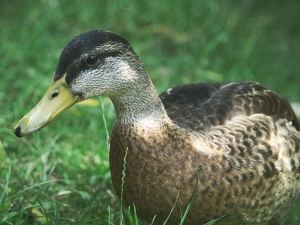
A variety of ailments can affect your ducks, these ailments can cause ducks to become lame, pant, discolor their beaks, discolor their wings, and cause the duck to develop a runny nose to name a few.
If your duck has a runny nose you’d be right to be concerned, this article looks into why this may be happening.
Table of Contents
Duck with a runny nose:
Duck illnesses can be minor and not cause much harm to the bird or they can be major and be quite dangerous for the bird.
Here are reasons why your duck may have a runny nose:
Clogged nostril
Ducks can sometimes release a discharge from their nose that is thin and clear. The birds will remove this discharge when they dip their nares into a water body and blow bubbles to get their nostrils clean.
If the birds don’t have access to water bodies that they can keep their nares clean in then the bird may develop a blocked nose. The blocked nose may release a discharge making the bird look as though it has a runny nose.
What to do:
Keep an eye on the bird to make sure that it does actually have a runny nose and doesn’t actually have a respiratory infection.
Keep an eye on the bird to see if the bird has any other symptoms of being ill or distressed. Symptoms of respiratory infection in ducks are outlined in the section on respiratory infections.
If you look into a duck’s nose, you should see daylight coming through from the other nose. If you don’t see daylight then the bird likely has a plug or a blockage in its nose.
If you figure out that the bird has a blocked nose then you can use saline to flush out the plug in the bird’s nose.
You can use saline nasal drops made for humans, the ones that deliver saline out of a dropper.
Flush the bird’s nostril out several times a day for a couple of days to see if this works for your bird.
You can alternatively give the bird access to a warm bathtub that is deep enough for the bird to dip its head in and blow to get the plug in its nose out.
Make sure to make water bodies available for your ducks at all times so they can blow their noses when they need to
Respiratory infection:
One of the symptoms of respiratory infection in ducks is a discharge coming from the bird’s nose. This discharge, on healthy ducks, is thin and clear but will be thicker and may have a color to it when produced by a sick bird
Other signs of respiratory infection in ducks include difficulty breathing, sneezing, lethargy, wheezing, watery eyes, coughing sounds, fluffy feathers, and voice changes to name a few.
A variety of different diseases can cause a respiratory infection in birds, this includes fungal infections, parasitic infections, viral infections, and bacterial infections.
What to do:
There are a variety of diseases that can cause your bird to develop a runny nose.
The best way to deal with this is to have the bird seen by a vet. A general cat, and dog vet who is open to working with ducks is a good place to start.
Taking the bird to an avian vet or an exotic pet vet would be even better.
Giving the vet your bird’s history will be helpful as well as the history of the disease in your bird. The vet will then be able to physically examine the bird, do some tests on the bird, and correctly diagnose the bird.
Once diagnosed the vet can prescribe medications for the bird depending on the reason for the runny nose.
If the bird has a bacterial infection then antibiotics will be prescribed, and antifungal medications will be given if the bird is suffering from a fungal infection.
Antiparasitic medications will be given if the bird has a parasitic infection.
Keep the regimen that your vet gives to your bird even at home. Also importing the bird’s diet if needed may be necessary and so will isolating the bird and giving the bird its own food and water if the vet recommended it
If you enjoyed this article then you may also be interested in other chicken related articles. Here are some articles that you may be interested in: Duck Is Choaking, Duck On Its Back, Duckling Flipping On Its Back, Pekin Duck Swollen Leg, Why Is My Duck Drooling?


